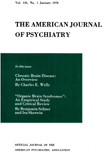SOME PROBLEMS OF DOSE VARIATION IN THE USE OF TRANQUILIZING DRUGS
Abstract
Early published studies of the use of tranquilizers revealed wide variations in the methods of studying the clinical effectiveness of these drugs. Some studies omitted dosages used in arriving at conclusions regarding drug action. Others included dosage schedules but did not establish clearly the criteria on which these dosages were based. Generally the overall approach in these investigations was empirical. Currently, suggested dosage ranges of chlorpromazine, reserpine and meprobamate show a greater consistency than in the past.
Three cases are presented to demonstrate some of the clinical problems encountered in the administration of these drugs. They emphasize the necessity of focusing on dose range-clinical response relationships in future investigations.
The design of a small pilot study is presented. It is considered that this type of study offers the best opportunity to gain valuable information about dosage and drug effect when carefully and systematically performed.
Access content
To read the fulltext, please use one of the options below to sign in or purchase access.- Personal login
- Institutional Login
- Sign in via OpenAthens
- Register for access
-
Please login/register if you wish to pair your device and check access availability.
Not a subscriber?
PsychiatryOnline subscription options offer access to the DSM-5 library, books, journals, CME, and patient resources. This all-in-one virtual library provides psychiatrists and mental health professionals with key resources for diagnosis, treatment, research, and professional development.
Need more help? PsychiatryOnline Customer Service may be reached by emailing [email protected] or by calling 800-368-5777 (in the U.S.) or 703-907-7322 (outside the U.S.).



